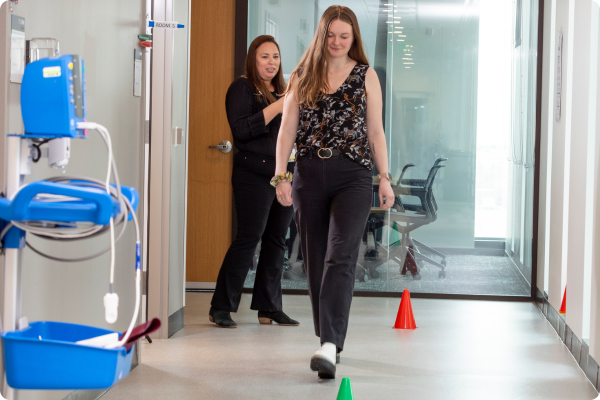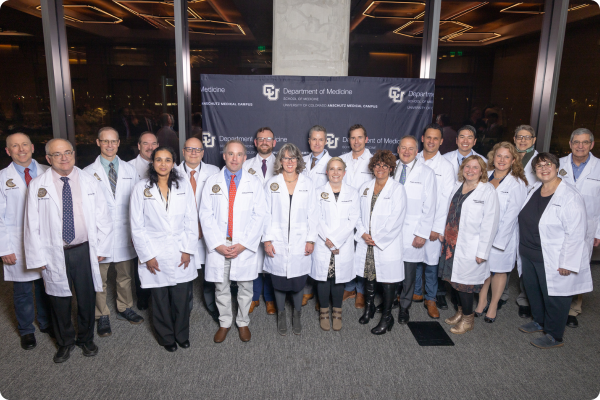-
Signs That Cognitive Changes Are Worrisome — And What You Can Do About It
As a geriatrician and palliative medicine physician, Hillary Lum, MD, PhD, has spent her career working to better the lives of older adults and their families, often raising awareness about what cognitive decline can look like and when it is concerning.
We sat down with Lum, an associate professor in the Division of Geriatric Medicine at the University of Colorado Department of Medicine, to talk about what cognitive decline is, symptoms to look out for, and how people can best protect their brain health.
➡️ Answering common questions about cognitive decline.
-
Why Children and Teens Should Avoid Nicotine Pouches Like Zyn
Nicotine pouches, particularly from the brand Zyn, have become popular on social media platforms like TikTok, attracting the eyes of teens and youth. Critics of the product have voiced concerns about marketing to young people, citing potential negative health impacts. Others have argued that nicotine pouches are a beneficial alternative to cigarettes or chewing tobacco.
Looking for more clarity on commonly asked questions about nicotine pouches, we spoke with Gina Kruse, MD, an internal medicine physician and visiting associate professor in the Division of General Internal Medicine at the University of Colorado Department of Medicine.
➡️ Potential health implications of nicotine pouches.
-
Do You Think You Have a ‘Cortisol Face’? What You Should Know About This TikTok Trend
Could heightened cortisol levels cause a person’s face to swell and be puffy? That’s what some social media users are claiming, with videos about so-called “cortisol face” garnering millions of views on platforms like TikTok.
To find answers about the legitimacy of “cortisol face,” we spoke with endocrinologist Christie Turin More, MD, an assistant professor of endocrinology, metabolism, and diabetes in the University of Colorado Department of Medicine who specializes her clinical practice and research in endocrine tumors, particularly pituitary tumors.
➡️ What is cortisol face?
-
CU Doctor Helps Long COVID Patients by Expanding Care, Research

Although the COVID-19 public health emergency has ended, a pressing health care crisis has emerged in its wake that many refer to as “long COVID” — a condition in which millions of Americans are experiencing negative symptoms weeks, sometimes even years, after a COVID infection.
Sarah Jolley, MD, an associate professor in the Division of Pulmonary Sciences and Critical Care Medicine at the University of Colorado Department of Medicine, is working to deliver multidisciplinary care to patients while also contributing to pivotal national research on this elusive illness.
➡️ Advancing long COVID clinical care and research.
-
How a Common Food Ingredient Can Take a Wrong Turn, Leading to Arthritis
Kristine Kuhn, MD, PhD, head of the Division of Rheumatology at the University of Colorado Department of Medicine, says she and her colleagues have identified the means in which bacteria in the digestive system can break down tryptophan in the diet into an inflammatory chemical that primes the immune system towards arthritis.
Tryptophan is an essential amino acid found in many protein-rich foods, including meats, fish, dairy products, and certain seeds and nuts, and has many beneficial uses in the body. Kuhn and her associates set out to learn how a substance that often is a force for good is converted into a pathway to inflammatory diseases such as rheumatoid arthritis.
➡️ The link between tryptophan and arthritis.
-
Champions For Their Patients: 21 Inducted Into CU Department of Medicine’s New Clinical Excellence Society

Twenty MDs and a Doctor of Nursing Practice were inducted into the inaugural class of the department’s Clinical Excellence Society (CES), recognized as champions for their patients. The CES program was launched to meet an unmet need — to recognize excellence in treating patients by medical faculty apart from their academic or research work.
“These are the doctors that patients get on the plane to come and see," Department of Medicine Chair Vineet Chopra, MD, MSc, told the audience. "They’re the ones that we want for our families, for our loved ones, and for people we care deeply about.”
➡️ Meet the clinicians.
-
A Call for More Research Into a ‘Highly Overlooked’ Infection That May Pose a Growing U.S. Threat
Chagas disease — a parasitic infection that affects an estimated 8 million people worldwide, mostly in Latin America – is drawing concern in the United States as well. The infection can lead to serious heart problems. And yet, the disease remains “highly overlooked” in the U.S., and “urgent action is required to implement national and local programs, bolstering health care responses and advancing research efforts,” says Andrés Henao-Martínez, MD, an associate professor in the CU Division of Infectious Diseases.
➡️ Why we should pay attention to Chagas diease.
-
CU Department of Medicine Infectious Disease Expert is Named to CDC Advisory Board
A University of Colorado Department of Medicine faculty member has been appointed to a national science committee advising the U.S. Centers for Disease Control and Prevention on infectious disease issues.
Joshua Barocas, MD, an associate professor in the divisions of Infectious Diseases and General Internal Medicine, is now one of 17 members of the CDC’s Board of Scientific Counselors (BSC) for infectious diseases. The BSC offers advice on “strategies, goals, and priorities for the programs and research within the national centers and monitors the overall strategic direction and focus of deputy director for infectious diseases and the national centers,” the CDC says.
➡️ An important national role for public health.
-
Could Getting Enough Sleep Help Prevent Osteoporosis?
As part of the University of Colorado Department of Medicine’s annual Research Day, faculty member Christine Swanson, MD, MCR, described her National Institutes of Health-funded clinical research on whether adequate sleep can help prevent osteoporosis.
“Osteoporosis can occur for many reasons such as hormonal changes, aging, and lifestyle factors,” says Swanson, an associate professor in the Division of Endocrinology, Metabolism, and Diabetes. “But some patients I see don’t have an explanation for their osteoporosis. Therefore, it’s important to look for novel risk factors and consider what else changes across the lifespan like bone does — sleep is one of those."
➡️ Exploring the connection between sleep and osteoporosis.
-
TikTok and Ozempic: CU Doctors Discuss Risks, Benefits of Advertising
As social media platforms like TikTok and Instagram have risen in popularity, so have direct-to-consumer advertisements for drugs like Ozempic, whether it be pop-up advertisements or social media influencers promoting products to their followers. Now, more and more people are asking their doctors to prescribe them drugs they have seen in advertisements, prompting three chief medical residents — Lynne Rosenberg, MD, Samantha Thielen, MD, and Evan Zehr, MD — in the University of Colorado Internal Medicine Residency Program to deliberate: Is this a beneficial or harmful occurrence?
➡️ Dangers and benefits of direct-to-consumer advertising.





